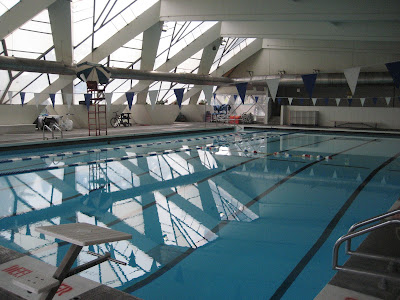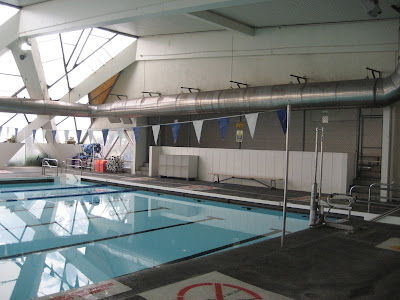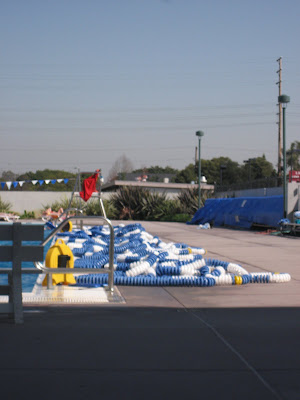
I never really thought of lifeguarding and art occurring in the same sphere, but I apparently someone else did. A new project by international non-profit organization “Portraits of Hope” will combine a philanthropic purpose with community-based art in a very unexpected place: lifeguard towers. From May to October, all 155 beach lifeguard towers along the 30 miles of coastline in Los Angeles County will be covered with colorful art panels. These panels have been a work in progress for the last several months, with mostly children as the artists behind these beautiful creations. Since January, “Portraits of Hope” has been getting help from Southern California children at various hospitals, schools, and non-profit community events, like the Special Olympics, to paint the panels that will be installed for the summer. More recently, the project has been open to the public to come paint on Saturdays through May right here in Marina Del Rey.
“Portraits of Hope” is known for its massive public art projects around the world that usually are exhibited in unexpected, everyday locations. One of the most well-known of these projects by the organization was in 2007 when all the taxicabs in New York City were covered in flower paintings for the “Garden in Transit” mobile art project. In addition to fostering a sense of community and creativity that is visible on a large scale, these kinds of projects also benefit areas of the world that are in need. To emphasize their community-driven message, Portraits of Hope also does not accept any government funding and instead relies on corporate and community sponsors.
The Los Angeles County project is being called “Summer of Color” and will benefit the victims of the recent earthquake in Haiti. After the project is disassembled in October, the panels will be sent to Haiti to decorate hospitals and temporary housing for people displaced by the earthquake. All canvasses featured in “Summer of Color” have three themes, shapes, flowers, and the ocean, and each theme has a reason behind it: shapes for the children who shape the future, flowers for beauty, inspiration and healing, and the ocean for the environment.
“Portraits of Hope” is known for its massive public art projects around the world that usually are exhibited in unexpected, everyday locations. One of the most well-known of these projects by the organization was in 2007 when all the taxicabs in New York City were covered in flower paintings for the “Garden in Transit” mobile art project. In addition to fostering a sense of community and creativity that is visible on a large scale, these kinds of projects also benefit areas of the world that are in need. To emphasize their community-driven message, Portraits of Hope also does not accept any government funding and instead relies on corporate and community sponsors.
The Los Angeles County project is being called “Summer of Color” and will benefit the victims of the recent earthquake in Haiti. After the project is disassembled in October, the panels will be sent to Haiti to decorate hospitals and temporary housing for people displaced by the earthquake. All canvasses featured in “Summer of Color” have three themes, shapes, flowers, and the ocean, and each theme has a reason behind it: shapes for the children who shape the future, flowers for beauty, inspiration and healing, and the ocean for the environment.
After hearing about “Summer of Color”, I’m surprised that I didn’t know about it before, because it’s currently the largest public arts project in the country and it’s happening right in our own backyards. However, I was thrilled to hear about this organization and the kind of work it does, especially this project. The beaches in Los Angeles County are a major part of the scenery here and such a huge aspect of what makes LA so unique as a city. Because they are so visible to so many people and are such a landmark of LA County and its beaches, turning the lifeguard towers into public art on display for the entire summer is a fantastic idea, and it’s even better because it has a philanthropic cause behind it. I wish I had been more aware of this so that I could have participated.
As a lifeguard, the lifeguard tower is something that we use every day and seems maybe the most unlikely place to find art. To people swimming at the pool or beach, however, the tower is a visible presence and physical reassurance that while you’re enjoying yourself, someone is there to watch and make sure everyone is safe. In that way, a lifeguard tower may also be one of the most fitting places to display a public art project like “Summer of Color” with its mission of creating a sense of community and teamwork. I’m happy to say that this summer I’ll be looking forward to going to the beach for more reasons than just the sun, sand, and waves.
To check out more of the artwork that will be displayed and to read more info on the project and Portraits of Hope, click on http://laist.com/2010/02/18/100_lifeguard_towers_to_become_publ.php?gallery0Pic=1#gallery
As a lifeguard, the lifeguard tower is something that we use every day and seems maybe the most unlikely place to find art. To people swimming at the pool or beach, however, the tower is a visible presence and physical reassurance that while you’re enjoying yourself, someone is there to watch and make sure everyone is safe. In that way, a lifeguard tower may also be one of the most fitting places to display a public art project like “Summer of Color” with its mission of creating a sense of community and teamwork. I’m happy to say that this summer I’ll be looking forward to going to the beach for more reasons than just the sun, sand, and waves.
To check out more of the artwork that will be displayed and to read more info on the project and Portraits of Hope, click on http://laist.com/2010/02/18/100_lifeguard_towers_to_become_publ.php?gallery0Pic=1#gallery







